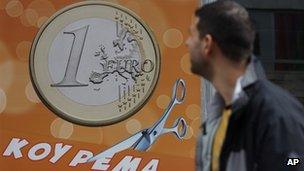How to love a Greek default
- Published
- comments

Here's a funny quirk of global financial capitalism: we should perhaps be hoping that Greece defaults tomorrow.
If you fear I've finally surrendered my sanity, here's why a Greek default might be a good thing.
What I mean by a default is that the International Swaps and Derivatives Association, ISDA, decides that there has been a so-called "credit event" relating to Greek government debt, and insurance contracts taken out against this debt, know as credit default swaps, or CDSs, are finally triggered.
As I understand it, ISDA may well reach this historic conclusion tomorrow afternoon.
The point is that some have expressed disbelief that there has not yet been such a credit event, given that private sector holders of Hellenic government bonds are being strong-armed into swapping them for new IOUs worth less than 30% of the face value of the original bonds.
If that's not a default, what is? Or at least that's a refrain you hear a good deal in the City.
But the ISDA viewpoint is that, in theory, this bond swap is voluntary. And if it's voluntary, there's no default.
However, tomorrow the Greek government may well announce that it is coercing those who don't wish to swap old bonds for new into doing so, by activating "collective action clauses" that were retrospectively inserted into the bonds' terms and conditions.
Were this to happen, just under $69bn gross (yes dollars), and $3.2bn of net CDS contracts written against Greek government bonds would be activated.
Which is enough to cause comfort or pain to individual banks and financial institutions, depending on whether they are buyers or sellers of the insurance, but not enough to bring the financial system to its knees.
By contrast, if the Greek CDSs were not triggered, Houston there may be a problem.
The point is that Greece's private sector creditors feel they are being forced into accepting a dramatic writedown of what Greece repays them. And if that were not to trigger CDS payments, what would? Or such at least is the question posed by many bankers and investors.
To put it another way, if ISDA's decision-making committee rules that Greek CDSs are useless for compensating those who had bought the CDSs to protect themselves from the very events that are happening, then it is difficult to see how any CDS contract written on any sovereign credit would have a value.
That, for example, would mean that those who had bought $320bn of protection against default by the Republic of Italy would probably have to write off most of that $320bn, because the insurance contract would be seen to be almost useless.
And there would equally be huge losses for those holding $163bn of protection taken out against Spain, $45bn taken out against Ireland, $64bn taken out against the risk of a default by the UK, and so on.
So failure to declare a default on Greece could render useless and valueless $2.7 trillion of other sovereign insurance contracts - and writing those off might well bring down the odd financial institution and even threaten the health of the financial system.
Which is why, as I said, you should perhaps ask for a Greek default, in your prayers tonight, to prevent additional stress in the financial system.